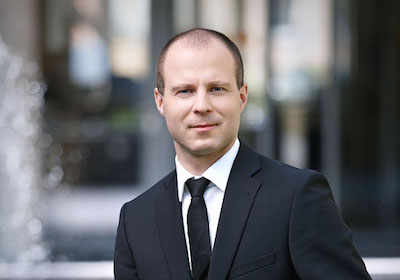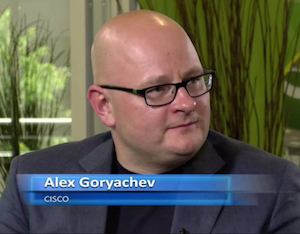
[Interview] Create Unexpected Value to PwC and Expected Value to Startups - Part 1
An interview with Mia Bennett, Head of Alliances and Special Projects, PwC, is a part of a series of interviews on enterprise innovation with corporate intrapreneurs, technology enthusiasts and visionaries within some of the world's largest companies.
Mia has been working in consulting and technology for more than 10 years, with an interest in mobile, startup and innovation (her current obsession is Blockchain). She founded a mobile app development agency, spun a series of products and projects that were featured by the BBC, the Guardian, WIRED, Fast Company and the Museum of Modern Art in New York.
If you are an idea person, a startup that wants to engage with big companies or a corporate employee who wishes to make things happen, you find a lot of useful tips in this interview.
Cindy Dam: Please tell us about what you do at PwC regarding alliances with new tech companies, startups, VCs, incubators and innovation hubs.
MB: What I do is quite interesting and unique. I sit in a team focused on transforming PwC. My role is to look at what our future could look like and how we can prepare for it. To get answers to these, I build and foster relationships with different players from the startup ecosystem; from startups that are working on new ventures, VC who are providing the capital, all the way to universities who are supporting the foundational research.
After that, I try to identify top talents and technologies that we can use in PwC, similar to sourcing deals. The relationship can be super simple, like finding suppliers, or complex, like building a partnership or alliances in order to build something together or solve problems for our clients in particular markets.
We keep the brief high level on purpose because we are experimenting and want to be flexible.
CD: How do you deal with internal silos within PwC?
MB: It’s really interesting. In the beginning, I thought that it would be quite tough to go out and meet a lot of people and pick the right partners. However, meeting top talent and technology is the easiest part. The challenge is to work with many silos within the company and demonstrate the value.
I learned to overcome the culture barrier and bring a common language. We all talk about the same thing, for example, bringing value to the market and customers. However, we (PwC and startups) have different ways of talking about it. I want to bring these two sides together and have started seeing some good traction.
There are many people across the firm who are in similar types of roles, but we all look from our own perspective. If somebody has a lense of innovation, they will look at innovative companies; those with the Fintech lense will look only at Fintech.
I’m trying to have a more generalistic outlook and link whomever I meet to people internally and connect internal people to each other and “break” the silos.
To truly do something transformative, we really need to collaborate across the company. So that is the message we try to get across and find out how to get people together.
CD: You’re like a connector.
MB: Absolutely. My official role internally is a connector. I look after the connections, source the deals, look for the right people and navigate all the different groups within the firms.
I also have some specialized themes that I look after. At this moment, I’m very focused on Blockchain and am mostly interested in this subject. But if someone from another vertical reaches out to me, I will still try to connect them to the right people.
CD: Do you have a criterion for accepting/rejecting ideas brought by startups
MB: I have a personal approach. I hold an open office on a specific day. Anybody can reach out to me. Sometimes I find a hidden gem from meeting people even through Twitter. I do some research on who they are, what they have said, what they have built and who else they connected to. But ultimately I care about understanding the problem they are trying to solve, their team and ability to execute.
The rest we can tweak, but we can’t change who they are and their abilities.
CD: What are your tips for people with ideas? Let’s say someone reads this article and says “Hey I have an idea, and I want to meet Mia to pitch my idea to PwC. What do I do?”
MB: It’s easy to reach out to me once you are prepared. These are the things you need to think about:
1) Clarity is important.
- Understand what they do. A lot of people miss that.
- What do the companies really care about at that moment in time? It’s easy to get a sense of this via their blog, tweets or press releases.
- Be very clear about what they are offering and what they want in return.
- What will the potential partnership look like? Am I a supplier? Do I want to sell something to them? Do I want to collaborate with them? Do I want to learn from them? Do I want them to learn from me?
Someone sent me a long email describing a CRM platform and wanted to schedule a 30-min meeting. This platform was very consumer driven but I couldn’t see a direct link to the partnerships I was driving. I told him so but offered to meet if he thought there was any value in that. He declined because he didn’t want to meet just for the sake of meeting. This is good because he knows the value of my time and his time.
2) Finding the right person
Every corporation has champions who are very enthusiastic about doing this kind of initiatives officially or unofficially, so you need to go and find those people.
2.1 Knowing that those people are nondecision-makers.
Be patient. You need to figure out how you can make a pitch appealing for the company. To make the life of your champion easier, prepare strong materials. This will be the starting point.
2.2 Having too many champions can be too much.
I found that when people try from different angles and connections, it makes it more difficult to push a deal forward. This could usually make the situation too political and damage the deal.
CD: PwC is a consulting firm, known for auditing services. I’m surprised to learn how active it is with new technologies and startups.
MB: I’m not surprised that you’re surprised. We have a heritage of audit, tax and accounting. But in fact, PwC also has a very large and active advisory side, covering Technology, Strategy, Finance, Sustainability and much more.
CD: Does PwC end up using these new technologies or recommending them to their clients?
MB: It’s a combination of both. We advise our clients on these topics, and we are big technology users.
My personal view is that in certain areas, especially innovation, we can’t be pure advisors. We need to try things and go beyond superficial advice.
CD: Big organizations have a lot of internal processes that deter innovation and entrepreneurial people. What do think about this?
MB: Absolutely. Processes are necessary for big companies; otherwise, they will become unmanageable. Processes are there to help the organisation be more efficient. But once you have a process, it’s hard for someone to say “I want to change it because I found a better way.” This is due to the nature of the beast.
Within PwC we have a number of innovation and entrepreneurial initiative, including programmes to help our colleagues refine their ideas and think about new businesses to organising meet ups and coding classes. There is another program I quite like, called Startup Journey. If you have an idea but never had a company, how would you start that journey? This product with help new entrepreneurs find their way.
Big organizations are complex and difficult to navigate, but the payoff can be large.
CD: It sounds more like Google than PwC.
MB: That’s a great compliment. Last year we formed a strategic partnership with Google. As it turned out, we compliment each other and by exchanging insight and collaborating, we can explore truly exciting new opportunities.
Click to read part 2 of the interview.
Have an interesting story to share? We'd like to hear about it. Contact us or tweet to us @TeskaLabs.
Most Recent Articles
You Might Be Interested in Reading These Articles

Security Architect Jiri Kohout: It's up to Us to Define How Secure The Internet Will Be
The security of connected applications, IoT, or mobile platforms, is based not only on secure development, but also on widespread knowledge about info security. Every user should have minimum knowledge about security. Every public tender should demand security of the final product or service.
Published on September 15, 2015

Interview with Alex Goryachev, the Mastermind behind Cisco’s Grandest Innovation Challenge
We spoke to Alex Goryachev about the recent Innovate Everywhere Challenge, an initiative from Cisco to empower employees to think and act like passionate entrepreneurs with greater agility, speed, and risk-taking.
Published on August 16, 2016

Security Researcher Filip Chytry: Online Security Is an Unattractive Topic - until People Get Hacked
I studied at Applied Cybernetics school and worked on various fields: robotics, networks and programming. There I got curious about security and became increasingly passionate about the industry, trying to learn more about cyber crime and attempting to hack into my classmates‘ computers for fun.
Published on August 20, 2015
